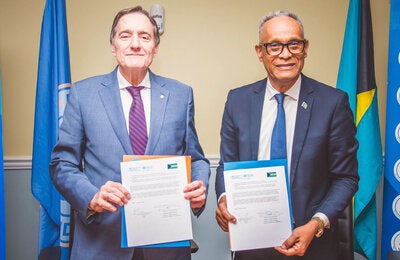

A 3-day meeting on the "Regional Initiative for the Elimination of Mother to Child Transmission of HIV and Congenital Syphilis" and a Joint meeting of the Technical Working Group in Port of Spain, Trinidad and Tobago, made clear that the Caribbean is the first region to advance the PAHO/WHO and UNICEF initiative.
 "Born HIV and Syphillis Free" - 25 October 2011, Port of Spain.
"Born HIV and Syphillis Free" - 25 October 2011, Port of Spain.
"The Elimination of Mother to Child Transmission of HIV and Congenital Syphilis is very important and is a milestone for the Public Health" and "No child should be born with HIV," words respectively from Dr. Gina Tambini, Area Manager for Family and Community Health from PAHO/WHO and Dr. Ernest Messiah, Director, UNAIDS Caribbean RST, at the opening of the PAHO/WHO HIV Caribbean Office's 3-day meeting on the "Regional Initiative for the Elimination of Mother to Child Transmission of HIV and Congenital Syphilis" and a Joint meeting of the Technical Working Group" from 25-27 October 2011, in Port of Spain, Trinidad and Tobago.

Opening remarks from PAHO/WHO and other partners- From L-R: Dr Gina Tambini, (Area Manager, FCH), Dr. Amalia Del Riego (Senior Advisor, PHCO), Mr. Rudy Cummings (CARICOM Health Desk), Dr. Ingrid Cox-Pierre (PANCAP); Dr Bernadette Theodore-Gandi (PAHO/WHO Representative in Trinidad) and Dr. Ernest Messiah (Director, UNAIDS Caribbean RST)
The Caribbean is the first region to advance the PAHO/WHO and UNICEF "Regional Initiative for the Elimination of Mother-to-Child Transmission of HIV and Congenital Syphilis in Latin America and the Caribbean" with the support from other Caribbean partners including CARICOM, PANCAP, UWI, CDC and UNAIDS. Through the PAHO/WHO convened meeting the Government and key partners in health in English, Dutch, French and Spanish- speaking Caribbean have been actively engaged in the process. In particular, the participating countries at this meeting included: Barbados, Dominican Republic, Guyana, Haiti, Jamaica, Suriname and Trinidad and Tobago.
The meeting sought to provide a technical review of the Field Guide, the Costing Tool and Case-base Surveillance related to the Elimination Initiative (EI) and also the review of the project framework to support mobilization of resources, with emphasis on the Multi-country proposal for Elimination Initiative to the Global Fund for AIDS, TB and Malaria (GFATM). Countries also identified the key gaps and immediate next steps for both the multi-country and country level proposal development and the accompanying technical cooperation needs to accelerate implementation of the EI Framework.
 These developments follow on from the 18th Meeting of the Caucus of CARICOM Ministers Responsible for Health in Washington, in which a commitment was launched by the Ministers to eliminate mother-to-child transmission of HIV and congenital syphilis in Latin America and the Caribbean by the year 2015. It was also iterated during the Ninth Annual General Meeting of the PANCAP, in Grenada, where approximately 120 Caribbean stakeholders endorsed the Initiative for Elimination of Mother-to-Child Transmission of HIV and Congenital Syphilis.
These developments follow on from the 18th Meeting of the Caucus of CARICOM Ministers Responsible for Health in Washington, in which a commitment was launched by the Ministers to eliminate mother-to-child transmission of HIV and congenital syphilis in Latin America and the Caribbean by the year 2015. It was also iterated during the Ninth Annual General Meeting of the PANCAP, in Grenada, where approximately 120 Caribbean stakeholders endorsed the Initiative for Elimination of Mother-to-Child Transmission of HIV and Congenital Syphilis.
The goal of this initiative is to reduce the incidence of mother-to-child HIV transmission to less than 5 % by the year 2015 and to reduce congenital syphilis to fewer than 0.5 cases per 1,000 live births, thereby eliminating these diseases as public health problems. The initiative also emphasizes the need to strengthen and integrate primary health care systems and to improve surveillance.
PAHO's Director, Dr. Mirta Roses Periago, commended the Caribbean for their leadership in public health, including the accomplishments in the elimination of polio, measles and smallpox and is convinced that the Caribbean has the potential to become the first region in the developing world to achieve the elimination targets.



